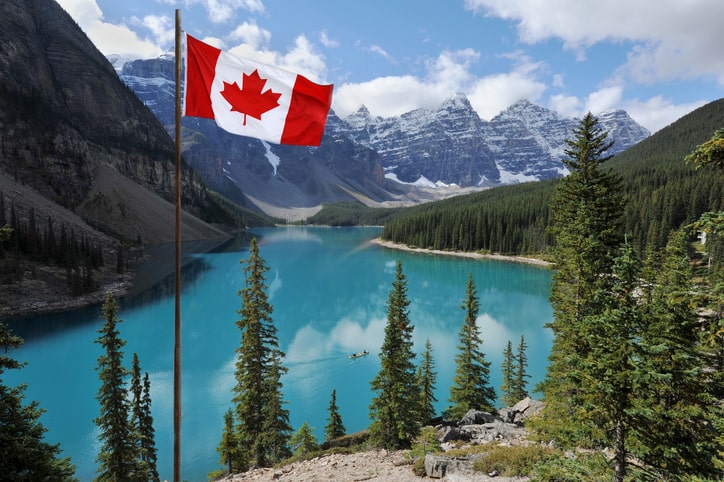Canada Day (Where, When, & Why)


If you say, “O Canada”, chances are that people will know what you are talking about. Many know the Great White North for its variety of wildlife, interesting food combinations, gorgeous landscape, and even its references in popular media like the TV shows “South Park” and “How I Met Your Mother”.
But Canada is much more than a nation of kind-hearted people with a penchant for hockey, ice skating, and fries smothered in gravy and cheese curds– which is exactly why Canada Day is celebrated. Find out more information on Canada, its history, and why observing Canada Day is an important public holiday that residents look forward to all year.
When Is Canada Day?
If you are wondering when to wish people a happy Canada Day, don’t worry. Canada Day falls on the same day every year, unlike some other holidays that depend on changes in the calendrical cycle.
Canada Day is celebrated on July 1st, with a variety of holiday activities and many people can enjoy a typical national day off when it falls on a weekday. The importance of July 1 traces back to the original Dominion of Canada under the British North America Act in the 1800s, and later when it became Dominion Day, as we will discover.
The rare exception to the July 1st recurrence is when Canada Day falls on a Sunday, at which time the statutory holiday would be observed on Monday, July 2, instead.
What Is Canada Day?
Canada Day is an important period of observance for Canadians both at home and abroad. It has its roots back when the land of Canada was a colony in British North America and was campaigning for a more settled and independent status. It’s a time to celebrate Canadian heritage and come together as a country.
When Did Canada Day Originate?
The first institution of a day where Canada was recognized by the British fell on July 1, 1867.
This occurred thanks to the British North America Act (also referred to as the Constitution Act, 1867 in certain modern sources), when the British Parliament instated Upper and Lower Canada, as well as New Brunswick and Nova Scotia, as the Dominion of Canada. Ontario and Quebec were later added to the Act when Lower Canada split into provinces.
While the British North America Act of 1867 would change over subsequent years, including as both provincial and federal governments were established and fought for more autonomy from England, Canada was officially born on that date.
And as further provinces and territories formed from the original 1867 landmass into what we now recognize as the ten provinces and three territories of modern Canada, this is exactly what Canadians have commemorated annually for the past 155 years!
Why Canada Day Is Celebrated
People tend to be proud of their heritage, and Canadians are no different. Their home and native land are important, with Canada Day being a great opportunity to come together and celebrate with a range of fun activities for families, friends, and individuals alike.
And while national pride is a positive thing to embrace, it’s also important to remember those who have lived across Canadian lands long before the Confederation or even the Dominion of Canada– the Indigenous people. Because many point out that Canada Day celebrations sometimes blatantly ignore the difficult path that Native Americans have been forced to endure and the hardships that are still present for many.
Canada Day and Indigenous People
Though Canada Day started essentially as the birthday of the country, it has shifted in terms of importance over the years. Canada Day celebrations have taken on certain political implications, particularly regarding the historic treatment of Indigenous people.
While federal and provincial celebrations do recognize the history of Canada as a country, the First Nations peoples across the nation have not enjoyed the same level of respect or government responsibility for the various atrocities that have befallen them.
This includes the horrific events of Residential Schools that worked to rip apart Indigenous families and communities, effectively stripping them of their identities. Shockingly enough, the last residential school was only closed in 1996, and it took until 2008 for the government to issue a statement from Parliament Hill in Ottawa, Ontario, when Prime Minister Stephen Harper apologized for this treatment.
As such, Canada Day has become entwined with the Truth and Reconciliation attempts that Canada has so long neglected to put into place regarding the crimes against First Nations people, with many protests pointing out the controversies therein.
This was particularly true when people called for Canada Day events to be canceled in the wake of finding over 750 unmarked graves on former Marieval Residential School property in Saskatchewan in June 2021.
How To Celebrate Canada Day
This year, Canada Day falls on Friday, July 1, 2022. Across the country, Canada Day events in major cities will include live entertainment, parades, and road closures that will make room for family fun like a pancake breakfast or a fireworks display.
If you are interested in taking part in the festivities, why not sing the national anthem or snack on some red-and-white goodies? And for anyone who wants to experience Canada Day in person, the federal government has released a list of Canada Day festivities by region for visitors to explore.
For further information on Canada, test your knowledge of iconic Canadian foods and Canadian facts with our quizzes, or play hangman games on Canadian animals and Canadian cities!
About the author







